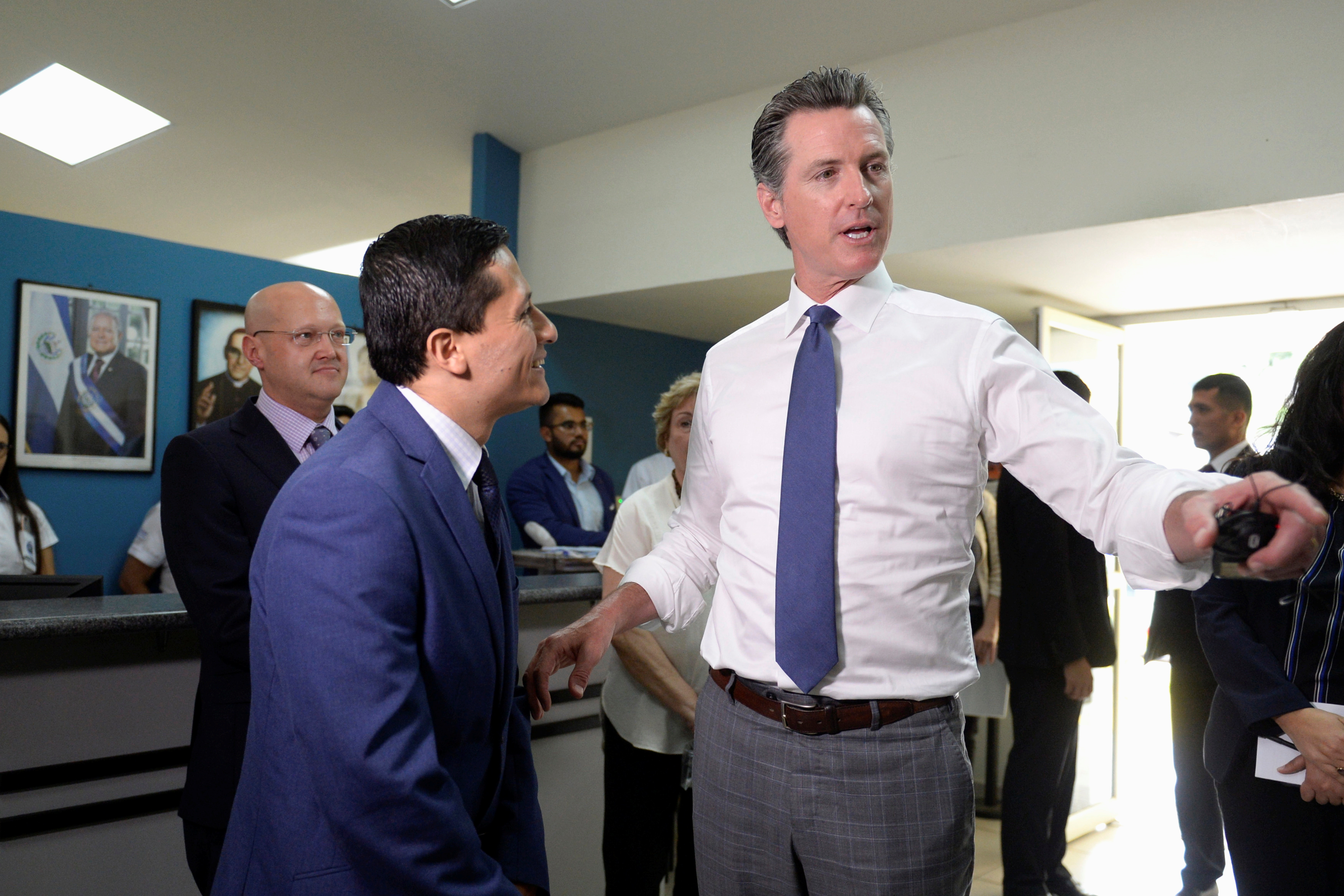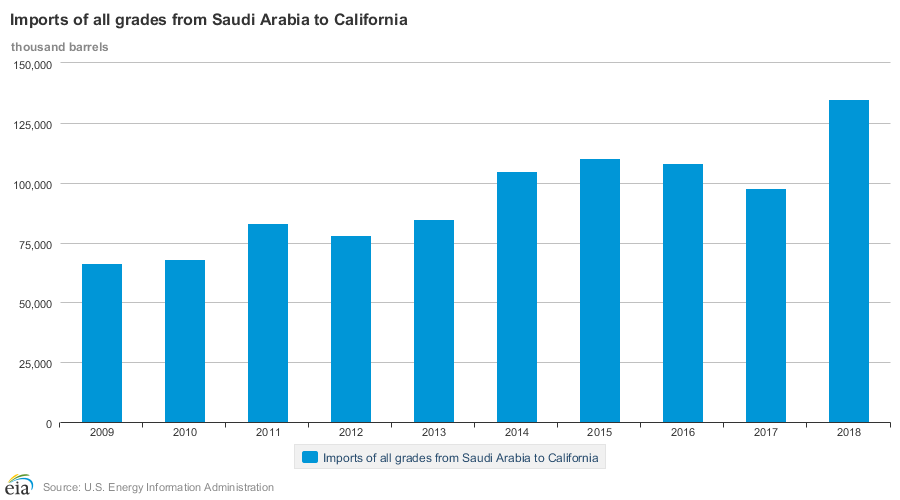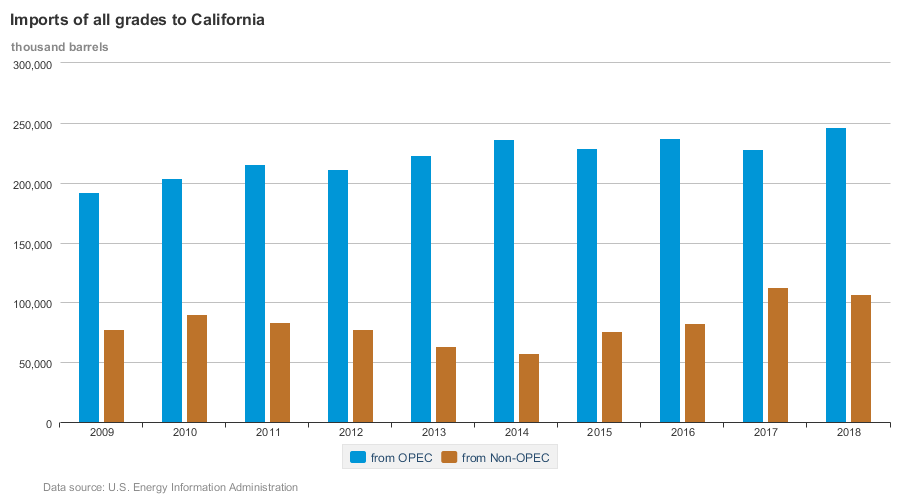- Gov. Gavin Newsom is considering restricting California’s oil industry, but doing so could make the Golden State even more reliant on foreign oil.
- Over nearly four decades, California went from being mostly fueled by domestic oil to mostly reliant on foreign crude, especially from Saudi Arabia.
- Not only does importing crude oil from Saudi Arabia mean more carbon dioxide emissions, it’s also coming from a country with a spotty human rights record.
Environmentalists are optimistic Democratic California Gov. Gavin Newsom will further restrict, or even end, oil and gas drilling, despite his state’s increasing reliance on oil shipped from abroad.
So-called “keep it in the ground” activists want to see Newsom ban new oil and gas leases, but anti-fossil fuel groups would also favor larger buffer zones between oil and gas production and buildings, like homes, schools and hospitals.
Sierra Club and other activists have met informally with Newsom’s administration to discuss curbing oil production, The Los Angeles Times reported Tuesday. The governor made no promises, but “expectations remain high,” The Times reported.
“I’m taking a very pragmatic look at it, in scoping this,” Newsom told The Times in a recent interview. “It’s also an inclusive scoping because it includes people in the industry, that have jobs; communities that are impacted from an environmental justice prism but also from an economic justice prism.”
California has 72,000 oil wells and consumes more gasoline than any other state. The oil industry also supports 368,000 jobs in the state, according to the Western States Petroleum Association.

Governor of U.S. state of California Gavin Newsom visits the premises of a migrant assistance office in San Salvador, El Salvador April 8, 2019. REUTERS/Jessica Orellana.
Newsom, however, does support moving California to 100 percent renewable energy, which means oil and gas production would have to go. That’s exactly what environmentalists lobbied Newsom and his predecessor Jerry Brown to do about oil and gas drilling.
Newsom acknowledged it would be difficult to immediately stop drilling, but he added that he wouldn’t be “exercising passivity” on the matter. (RELATED: Trump Gave Up On A Key Part Of His ‘Energy Dominance’ Agenda. Why?)
“It’s a challenging issue. There’s a reason Gov. Brown used a lot of dexterity on this issue,” Newsom told The Times.
Further restricting in-state oil and gas production could exacerbate California’s increasing reliance on foreign oil. The state imported more than 369 million barrels of oil, nearly 58 percent, last year, the biggest share coming from Saudi Arabia.
The Saudis shipped nearly 135 million barrels of oil to California refineries throughout 2018, according to the California Energy Commission. Ecuador, California’s second-largest oil source, shipped nearly 52 million barrels to the Golden State last year.
Saudi oil shipments hit a record 14.75 million barrels in January 2019, according to the most recent data from the U.S. Energy Information Administration (EIA).

Source: U.S. Energy Information Administration
California’s become increasingly reliant on foreign oil imports to fuel its economy. In 1982, the state got roughly 94 percent of its oil from in-state and Alaska, but lagging production in both states has been supplanted by overseas supplies.
Now, California gets roughly 43 percent of its oil domestically with the rest coming from abroad. Saudi Arabia has long been California’s biggest foreign supplier of oil, but the Kingdom’s shipments exploded in the last two years.
Shipping oil in from abroad results in more carbon dioxide emissions than extracting it domestically, though U.S. drilling is subject to stricter environmental regulations on pollution.
Saudi Arabia heads the Organization of Petroleum Exporting Countries (OPEC). California has become more reliant on OPEC oil in recent years, including from Ecuador, Kuwait and Iraq.

Source: U.S. Energy Information Administration
Saudi Arabia is also among the world’s top three oil-producing nations, but the country has also been criticized for its spotty human rights record.
Human rights abuses included “unlawful killings; executions for nonviolent offenses; forced renditions; forced disappearances; and torture of prisoners and detainees by government agents,” according to a 2018 State Department report.
In the Kingdom, there’s also “violence and official discrimination against women, although new women’s rights initiatives were implemented; criminalization of consensual same-sex sexual activity; and prohibition of trade unions,” reads the report.
However, environmentalists say they have confidence Newsom will be more aggressive than Brown in regulating drilling.
“He’s also been very good at pushing back hard at Trump’s climate change denials,” Kassie Siegel of the Center for Biological Diversity told The Times.
“We need him to take that bold approach when it comes to the oil industry,” Siegel said.
The Trump administration, on the other hand, unveiled its plan Thursday to open 1 million acres of public and private lands in California to hydraulic fracturing, or fracking, a drilling technique behind the U.S. energy boom.
All content created by the Daily Caller News Foundation, an independent and nonpartisan newswire service, is available without charge to any legitimate news publisher that can provide a large audience. All republished articles must include our logo, our reporter’s byline and their DCNF affiliation. For any questions about our guidelines or partnering with us, please contact licensing@dailycallernewsfoundation.org.


